As scores of activists yesterday protested outside Chinese Nationalist Party (KMT) headquarters over the legislature’s failure to pass proposed constitutional changes on Tuesday, KMT Chairman Eric Chu (朱立倫) blamed the opposition for obstructing the amendments for its own ends.
Tuesday was the last day of the legislature’s plenary session and the last opportunity for the constitutional amendment bills to pass in time for a referendum on the reforms to take place alongside the presidential and legislative elections on Jan. 16.
The legislature failed to pass the bills, with the two major parities at loggerheads over whether the amendments should be approved separately or as a package.
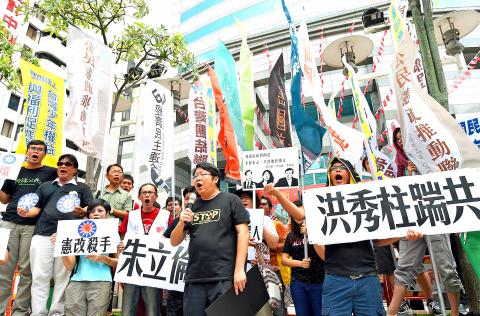
Photo: Chien Jung-fong, Taipei Times
The Democratic Progressive Party (DPP) called for the passage of the amendments that had secured cross-party-caucus consensus, such as the lowering of the voting age and the threshold for parties to secure representation in the legislature, while leaving the contentious ones to the next stage of reform.
However, the KMT insisted that absentee voting and the legislature’s power to approve the premiership, which it says has wide public support, should be passed in tandem.
The Civil Alliance to Promote Constitutional Reform and members of several other civil groups, including the Green Party and the Social Democratic Party, yesterday gathered outside KMT headquarters to protest the party’s insistence on pushing its own constitutional proposals “for the party’s benefits, without caring about the nation’s reform.”
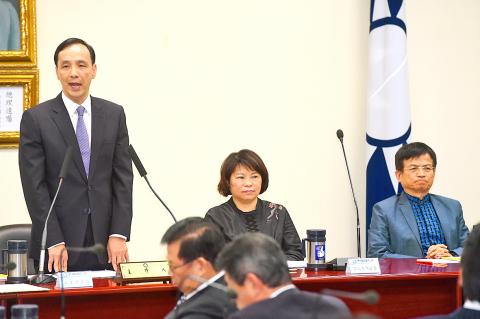
Photo: Chien Jung-fong, Taipei Times
Some hurled eggs at the building.
The same group had staged a sit-in outside the legislature on Tuesday, demanding it pass the bills on lowering the voting age and the party threshold. After learning that cross-party negotiations in the legislature had broken down, the protesters accused the KMT of “kidnapping” the bills, saying that “the infamy of the party’s move will go down in history.”
During the rally outside KMT headquarters, where the party was holding its weekly Central Standing Committee meeting, lawyer and activist Lai Chung-chiang (賴中強) said KMT caucus whip Lai Shyh-bao (賴士葆) once said — according to media reports — that constitutional amendments “cannot include only those requested by the DPP, but also have to include those the KMT wants.”
“Is the lowering of the voting age and the party threshold not what the KMT wants? Does it mean that Chu and Deputy Legislative Speaker Hung Hsiu-chu (洪秀柱), who have both voiced their support [for the two amendments], are lying?” Lai asked.
The KMT did not directly respond to the protesters, but Chu said at the committee meeting that the proposals to empower the legislature to confirm the premier and allow absentee voting “are the two constitutional amendment proposals that have the greatest popular support and are the most significant.”
The DPP made it impossible to review and vote on the proposed amendments — including lowering the voting age and the threshold for political parties to secure legislator-at-large seats — to pursue its own interests and political motives,” Chu said.
However, DPP caucus whip Ker Chien-ming (柯建銘) on Tuesday said that, according to Lai, it was the KMT leadership’s directive to oppose the separate handling of the proposals.
The protesters said that the proposed constitutional reform had been a political tool all along and called on voters to sweep the old political forces out of the Legislative Yuan in January’s elections.
DPP Chairperson Tsai Ing-wen (蔡英文) rejected Chu’s accusations that the DPP was at fault.
“Constitutional reform does not serve the interests of a party, but that of Taiwan and the rights of its citizens, especially the younger generation. That is why we hoped to lower the voting age to 18,” Tsai said.
“Lowering the voting age and the threshold for political parties to acquire at-large seats are two proposals that different political parties and the public agree on. If we are all sincere about constitutional reform, we should first adopt those parts on which we all agree,” she said.
The KMT’s move to tie the two proposals with other more contentious proposals is regrettable, as it does not benefit the nation and deprives many of their rights, the DPP’s presidential candidate said.
Accusing the KMT of mudslinging, Tsai said: “I want to tell my rivals that they cannot stop me by trying to irritate me. I have more important things to do. I want to push for change for Taiwan and that is something that people care about.”
Tsai said the KMT has always opposed progressive values, despite its claims that it supports constitutional reform.
She said that Chu and Hung owe the public an explanation, as they had both voiced their support for lowering the voting age.
“Whether we return to power or not, the DPP will honor its promises to continue to push for constitutional reforms,” Tsai said.
Additional reporting by Loa Iok-sin
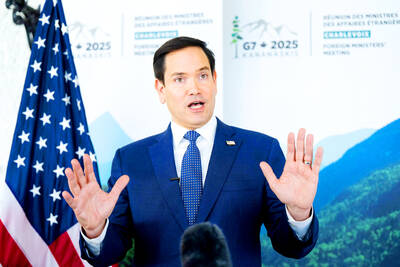
‘CROWN JEWEL’: Washington ‘can delay and deter’ Chinese President Xi Jinping’s plans for Taiwan, but it is ‘a very delicate situation there,’ the secretary of state said US President Donald Trump is opposed to any change to Taiwan’s “status quo” by force or extortion and would maintain that policy, US Secretary of State Marco Rubio told the Hugh Hewitt Show host on Wednesday. The US’ policy is to maintain Taiwan’s “status quo” and to oppose any changes in the situation by force or extortion, Rubio said. Hewitt asked Rubio about the significance of Trump earlier this month speaking with Taiwan Semiconductor Manufacturing Co (台積電) chairman C.C. Wei (魏哲家) at the White House, a meeting that Hewitt described as a “big deal.” Asked whether the meeting was an indication of the
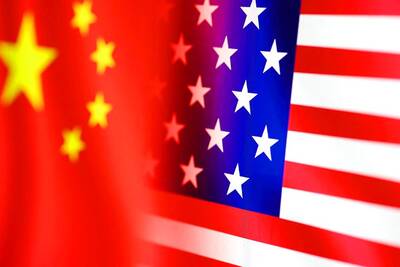
‘RELATIVELY STRONG LANGUAGE’: An expert said the state department has not softened its language on China and was ‘probably a little more Taiwan supportive’ China’s latest drills near Taiwan on Monday were “brazen and irresponsible threats,” a US Department of State spokesperson said on Tuesday, while reiterating Washington’s decades-long support of Taipei. “China cannot credibly claim to be a ‘force for stability in a turbulent world’ while issuing brazen and irresponsible threats toward Taiwan,” the unnamed spokesperson said in an e-mailed response to media queries. Washington’s enduring commitment to Taiwan will continue as it has for 45 years and the US “will continue to support Taiwan in the face of China’s military, economic, informational and diplomatic pressure campaign,” the e-mail said. “Alongside our international partners, we firmly
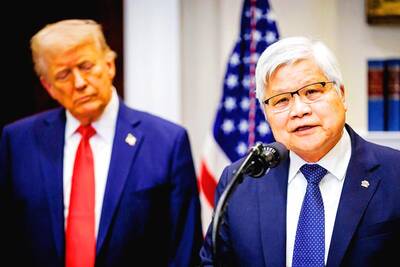
KAOHSIUNG CEREMONY: The contract chipmaker is planning to build 5 fabs in the southern city to gradually expand its 2-nanometer chip capacity Taiwan Semiconductor Manufacturing Co (TSMC, 台積電), the world’s biggest contract chipmaker, yesterday confirmed that it plans to hold a ceremony on March 31 to unveil a capacity expansion plan for its most advanced 2-nanometer chips in Kaohsiung, demonstrating its commitment to further investment at home. The ceremony is to be hosted by TSMC cochief operating officer Y.P. Chyn (秦永沛). It did not disclose whether Premier Cho Jung-tai (卓榮泰) and high-ranking government officials would attend the ceremony. More details are to be released next week, it said. The chipmaker’s latest move came after its announcement earlier this month of an additional US$100 billion
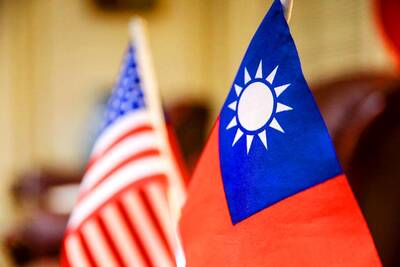
COUNTERING THE PLA: While the US should reinforce its relations with partners and allies, Taiwan must invest in strengthening its defenses as well, Phillip Davidson said If influence in the Indo-Pacific region is one of the US’ core interests, then Taiwan serves as a cornerstone of US economic and security influence in the region, former US Indo-Pacific Command commander admiral Phillip Davidson said on Thursday. “China’s ... strategy is to supplant the US leadership role in the international order ... and they’ve long said ... that they intend to do that by 2050,” Davidson told the National Review Institute’s Ideas Summit in Washington. Davidson said he had previously told US Senate hearings on China’s military activities and possible threats in the Indo-Pacific region that a Chinese invasion of